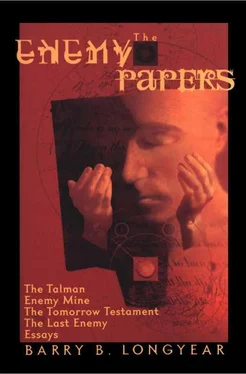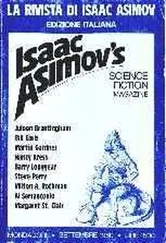And when the rites were completed, Caduah applied for Shizumaat to become a servant of Aakva.
Ebneh was the servant who had heard the child’s recitation, and Ebneh was sufficiently impressed by the performance that it enrolled Shizumaat into the Aakva Kovah, the School of God. The nights Shizumaat would spend in its parent’s house; the days Shizumaat would spend in the temple learning the secrets, signs, laws, wishes, and visions of the Parent of All.
I, Namndas, had entered the Aakva Kovah the year before Shizumaat, and was placed in charge of Shizumaat’s class. I drew this duty because the servants of the temple considered me the least worthy of my own class. While my companions sat at the feet of the servants and engaged in learned discourse, I would chase dirt.
My charges were assigned a place in the darkness next to the Madah wall where my own class had begun the year before. On the morning of the first day of their instruction, Shizumaat’s class sat upon the smooth stone floor and listened as I spoke the rules of the temple.
"I, Namndas, am your charge-of-class. You are the lowest class in the temple, and for this reason, the care and cleaning of the temple is left to you. I tell you now that I will never find as much as a single fleck of dust in the temple while I am your charge-of-class. You will clean the filth from the air before it lands upon these stones; you will wash the dust from the feet of those who enter the temple." I pointed toward the soot-blackened ceiling. "Every evening it is your responsibility to trim and fuel the temple’s lamps. Through all of this, you will keep clean yourselves. Your bodies will be clean and your robes clean and mended."
Shizumaat stood. It was tall for its age, and there was a strange brightness to its eyes. "Namndas, when are we to be given our instruction? When will we learn?"
I felt my face grow hot. Such impudence! "You shall be allowed to receive instruction when I inform Servant Ebneh that you are worthy. Sit and be silent!"
Shizumaat resumed its seat upon the floor, and I issued a glare that encompassed all nine of them. "You will not speak except in answer to a question from me or from one of the servants. You are here to learn, and the first thing you must learn is obedience."
I returned my glare to Shizumaat and saw it carrying an enigmatic expression upon its face. I spoke to Shizumaat. "I cannot read your face, new-charge. What does it say?"
Shizumaat remained seated upon the floor, but looked at me as it spoke. "Does Aakva, then, judge its servants by how well they imitate the dumb animals, and their skill at wielding a scrub rag?"
"Your words court disaster."
"Namndas, when you asked your question, did you want from me lies or truth?"
"This is a temple of truth. What are you called?"
"I am called Shizumaat."
"Then, Shizumaat, I must tell you that I see little hope for your graduation from the Madah wall to the center of the temple."
Shizumaat nodded and looked past the forest of columns toward Uhe’s tomb. "I think the truth serves you at last, Namndas."
The days passed, and although it remained silent, Shizumaat performed its temple duties well enough. Shizumaat, however, always appeared restless; and it listened to all the talk of the temple as though trying to memorize it. By the time two new classes were formed, and my charges occupied the south end of the Madah Wall, Ebneh stood before the class to hear their recitations of Aakva, Rhada, Daultha, and Uhe.
When all had completed their recitations, Ebneh held out its hands. "We call the Story of Uhe the Koda Ovida; and what is the first truth?"
There are, of course, many truths within the first Koda. The student’s task is to draw from the story the greatest truth. The first student stood and spoke the accepted truth of the story: "That it is Aakva’s law that the servants of Aakva will speak the true wishes of Aakva."
Ebneh nodded, pleased. "And do you all agree?"
All of the students nodded, except for Shizumaat. My rebel stared through the columns at Uhe’s tomb until Ebneh called out. "Shizumaat, were you listening?"
Shizumaat’s eyes turned toward Ebneh. "I was listening."
"Do you agree to this student’s interpretation of the Koda Ovida?"
"No." Shizumaat looked back toward Uhe’s tomb.
"No? No?" Ebneh stood next to Shizumaat. "You will stand and explain!" Shizumaat stood and looked at Ebneh. "What truth do you see in the Koda Ovida?" demanded the servant.
"Ebneh, I see that a rule stood between the Mavedah and survival; I see that the rule was nothing sacred, but made by Sindie; and I see that Uhe saw this and cast the rule aside to save its people. The truth I see, then, is that rules are meant to serve the Sindie; the Sindie is not meant to serve rules."
Ebneh stared in shock at Shizumaat for a long moment; and then it asked: "Then, Shizumaat, should we or should we not obey the wishes of Aakva handed down by the servants?"
"If the rule is good, it should be obeyed; if it is not good, it should be cast aside as Uhe cast aside the Law of Peace."
Ebneh’s eyes narrowed, and those who sat near Shizumaat edged away from it to avoid the wrath that all could see gathering above Caduah’s child. The servant continued with a voice filled with menace. "Shizumaat, do you say that the laws of Aakva can be false?"
I closed my eyes. Ebneh was tricking Shizumaat into blasphemy. I sent a warning with my eyes, but Shizumaat ignored me. It knew what Ebneh was doing. Shizumaat was too stubborn, however, to bow to the pain the servants would inflict on its body upon the admission of the blasphemy. It would not recant and would be broken. Shizumaat spoke: "If the laws come from the servants, then the laws come from mortal, fallible creatures, and can be false."
Ebneh stood upright. "But if the laws come from Aakva?"
"Then either Aakva is fallible, or there is no Aakva. This I saw in the Story of Uhe."
A terrible silence came down upon the temple. I rushed up to Shizumaat and grabbed it by the arm. "Think, Shizumaat! Think upon what you say!"
Shizumaat pulled its arm away from my grasp. "I have thought upon it, Namndas. That is why I answered as I did."
Ebneh pushed me away from the student. "Stand you away, Namndas, unless you choose eternity by the Madah Wall!" The servant was so angry spittle from its lips flew into my face. I was too frightened to wipe it away. Slowly Ebneh turned and faced Shizumaat. "Do you know what you will suffer because of your words?"
The young one smiled. "Yes, Ebneh. I know the rules."
"You know them, yet you scorn them?"
"I do not scorn them. I question them. I question their source. I question their validity. I know the servants will beat me for what I have said; but I ask you this: will beating me prove the existence of Aakva and the truth of its laws?"
The servant made a sound as though it was being strangled, then it ran from the Madah Wall, shouting orders as it hurried away. Shizumaat was to face the God of the Day Light.
In the morning, with the Parent of All illuminating the eastern columns of the temple, I climbed the steps and found Shizumaat on its knees between the columns, its face resting against the paving stones. The stones were stained with the deep yellow of the student’s blood. Shizumaat’s eyes were closed, its chest heaving. Behind Shizumaat were two servants holding long whipping rods. Ebneh stood to Shizumaat’s side and ordered, "Look up, Shizumaat. Look up!"
Shizumaat placed its hands upon the blood-stained stones and pushed until it sat back upon its heels, the morning light of Aakva showing the gray of Shizumaat’s face. "I am looking."
"What do you see?"
Shizumaat teetered for a moment, its eyes squinted, then it took a deep breath and exhaled slowly. "I see the great morning light we call Aakva."
Читать дальше











